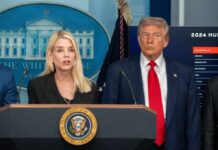
Brazil’s Supreme Court just slammed the door on automatic U.S. sanctions, sending a strong message about national sovereignty.
Story Snapshot
- Brazil’s Supreme Federal Court (STF) ruled foreign sanctions, including those from the U.S., are invalid unless approved by Brazilian legal bodies.
- The ruling was a direct response to recent U.S. sanctions against Brazilian Justice Alexandre de Moraes.
- This decision sets a precedent for resisting extraterritorial application of foreign laws and defending judicial independence.
- U.S.-Brazil tensions over judicial authority and human rights have escalated, with implications for global legal cooperation.
Brazil’s Supreme Court Blocks Automatic U.S. Sanctions
On August 18, 2025, Justice Flavio Dino of Brazil’s Supreme Federal Court (STF) issued a landmark ruling that foreign laws, including U.S. sanctions, cannot automatically take effect in Brazil. Such measures must first be examined and approved by Brazilian authorities or incorporated into domestic law, as mandated by Brazil’s Federal Constitution. This move directly rebuffs the recent U.S. sanctions placed on Justice Alexandre de Moraes, signaling a firm stance on judicial sovereignty and a refusal to allow foreign executive orders to override national legal processes.
Brazil's Supreme Court exempts citizens from foreign legal decisions amid spat with US https://t.co/9gVwMqcCNs
— ST Foreign Desk (@STForeignDesk) August 18, 2025
Brazil’s decision came after the U.S. Department of State revoked the visas of Justice de Moraes and his family on July 18, followed by Treasury sanctions under the Global Magnitsky Act on July 30. The STF’s August ruling clarified that foreign judicial decisions, decrees, and executive orders have no direct validity within Brazil unless subjected to domestic approval. This explicit assertion of sovereignty marks a new phase in Brazil’s approach to international legal pressures, especially those emanating from Washington.
Watch; Brazil’s Justice Moraes ignores US sanctions, says will continue doing his job
Judicial Independence and Constitutional Safeguards
Brazil’s legal tradition, rooted in civil law, insists that foreign judgments must be formally recognized by the Superior Court of Justice (STJ) before they carry any weight domestically. The STF’s ruling reaffirms these constitutional safeguards, protecting the nation’s judiciary from extraterritorial interference. Brazilian officials, led by Justice Dino, argue that the ruling is essential for maintaining the integrity of domestic legal processes and shielding the judiciary from politically motivated foreign actions.
The events unfolded amid intense U.S.-Brazil tensions over digital platform regulation, freedom of speech, and the prosecution of former President Jair Bolsonaro. U.S. officials have accused Justice de Moraes of suppressing dissent and targeting political opponents, prompting sanctions and public statements demanding accountability. Brazil’s judiciary, however, views these moves as attempts to undermine its independence and exert undue influence over national affairs. The STF’s stance reflects a broader trend among countries asserting their right to resist the global reach of U.S. laws and sanctions.
Implications for U.S.-Brazil Relations and Global Policy
In the short term, the STF ruling means U.S. sanctions and legal orders cannot be enforced in Brazil without formal domestic approval. Brazilian officials and entities targeted by foreign sanctions remain shielded from direct enforcement, while U.S. companies operating in Brazil face increased legal uncertainty.
Long-term, this precedent may encourage other nations to challenge the automatic application of U.S. sanctions and legal orders, potentially complicating international efforts to promote human rights and combat corruption. Technology companies and financial institutions may face increased compliance challenges as they navigate conflicting legal demands from the U.S. and Brazil. The ruling has elevated the conversation around the limits of extraterritorial enforcement and the importance of judicial independence worldwide.
Sources:
White House statement on Brazil-U.S. tensions (2025-07-30)
U.S. Treasury sanctions announcement (2025-07-30)
U.S. State Department sanctions statement (2025-07-30)
Stratfor analysis of STF ruling (2025-08-19)
Global Sanctions legal analysis (2025-08-20)

























